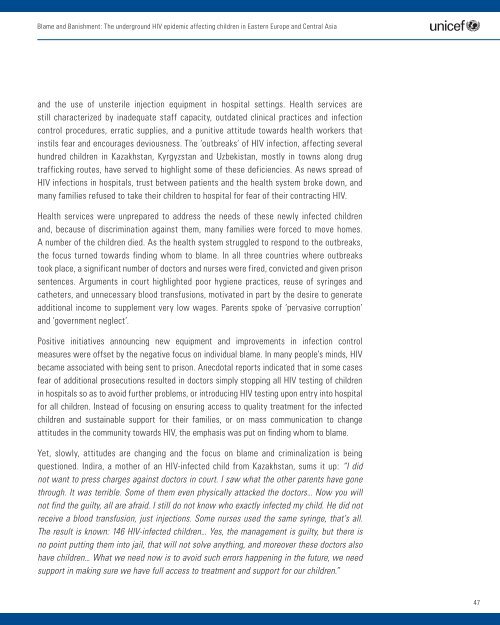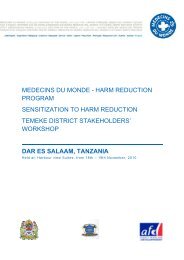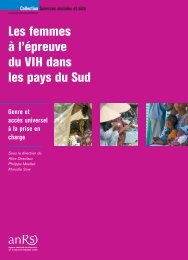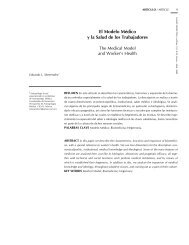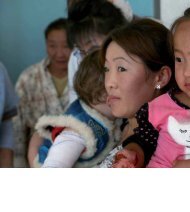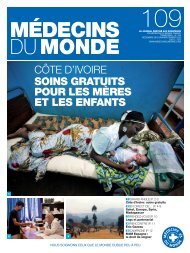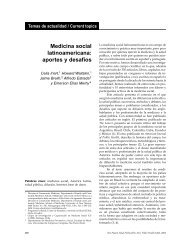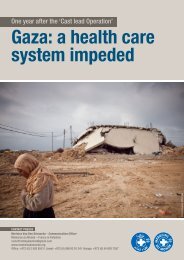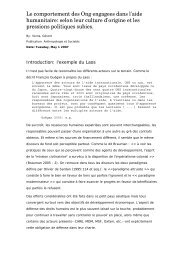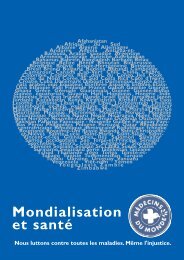Blame & Banishment - Médecins du Monde
Blame & Banishment - Médecins du Monde
Blame & Banishment - Médecins du Monde
You also want an ePaper? Increase the reach of your titles
YUMPU automatically turns print PDFs into web optimized ePapers that Google loves.
<strong>Blame</strong> and <strong>Banishment</strong>: The underground HIV epidemic affecting children in Eastern Europe and Central Asia<br />
and the use of unsterile injection equipment in hospital settings. Health services are<br />
still characterized by inadequate staff capacity, outdated clinical practices and infection<br />
control proce<strong>du</strong>res, erratic supplies, and a punitive attitude towards health workers that<br />
instils fear and encourages deviousness. The ‘outbreaks’ of HIV infection, affecting several<br />
hundred children in Kazakhstan, Kyrgyzstan and Uzbekistan, mostly in towns along drug<br />
trafficking routes, have served to highlight some of these deficiencies. As news spread of<br />
HIV infections in hospitals, trust between patients and the health system broke down, and<br />
many families refused to take their children to hospital for fear of their contracting HIV.<br />
Health services were unprepared to address the needs of these newly infected children<br />
and, because of discrimination against them, many families were forced to move homes.<br />
A number of the children died. As the health system struggled to respond to the outbreaks,<br />
the focus turned towards finding whom to blame. In all three countries where outbreaks<br />
took place, a significant number of doctors and nurses were fired, convicted and given prison<br />
sentences. Arguments in court highlighted poor hygiene practices, reuse of syringes and<br />
catheters, and unnecessary blood transfusions, motivated in part by the desire to generate<br />
additional income to supplement very low wages. Parents spoke of ‘pervasive corruption’<br />
and ‘government neglect’.<br />
Positive initiatives announcing new equipment and improvements in infection control<br />
measures were offset by the negative focus on indivi<strong>du</strong>al blame. In many people’s minds, HIV<br />
became associated with being sent to prison. Anecdotal reports indicated that in some cases<br />
fear of additional prosecutions resulted in doctors simply stopping all HIV testing of children<br />
in hospitals so as to avoid further problems, or intro<strong>du</strong>cing HIV testing upon entry into hospital<br />
for all children. Instead of focusing on ensuring access to quality treatment for the infected<br />
children and sustainable support for their families, or on mass communication to change<br />
attitudes in the community towards HIV, the emphasis was put on finding whom to blame.<br />
Yet, slowly, attitudes are changing and the focus on blame and criminalization is being<br />
questioned. Indira, a mother of an HIV-infected child from Kazakhstan, sums it up: “I did<br />
not want to press charges against doctors in court. I saw what the other parents have gone<br />
through. It was terrible. Some of them even physically attacked the doctors... Now you will<br />
not find the guilty, all are afraid. I still do not know who exactly infected my child. He did not<br />
receive a blood transfusion, just injections. Some nurses used the same syringe, that’s all.<br />
The result is known: 146 HIV-infected children... Yes, the management is guilty, but there is<br />
no point putting them into jail, that will not solve anything, and moreover these doctors also<br />
have children... What we need now is to avoid such errors happening in the future, we need<br />
support in making sure we have full access to treatment and support for our children.”<br />
47


